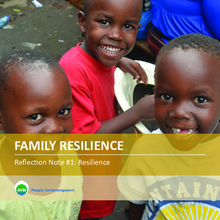AVSI’s long history in Uganda continues to be shaped by the experiences and learning that came from the early years. During the period 1985 – 2000, AVSI accompanied the people of northern Uganda through two dramatic crises: the war with the LRA including the traumatic effects on the population and decades of displacement, and the outbreak of the HIV/AIDS pandemic. During those years, AVSI’s sensitivity to the person by having a holistic approach able to consider all his/her needs (material, psychological, social), and in particular of children, led to deep reflection on the psychological effects of these crises and corresponding means to mitigate and address trauma. This holistic approach FARE (a project of ASPIRES) takes embraces the entire family and community around vulnerable children is holistic and flexible to meet the needs of individual cases. The approach draws on the innovative method developed by AVSI’s Sustainable COmprehensive REsponses for the Vulnerable Children and their Households (SCORE) project. Like SCORE, FARE does research to find ways to strengthen households economically and conducts interventions to make families more resilient so that children will not be separated from their parents.
This Reflection Note is intended as a means for AVSI staff and implementing partners on the FARE project to capture emerging learning as relates to the theory of change elaborated during project design. The methodology used for this background note was desk review of project proposal documents and reference materials, complemented by semi-structured interviews with AVSI and FARE staff.
Read also:

